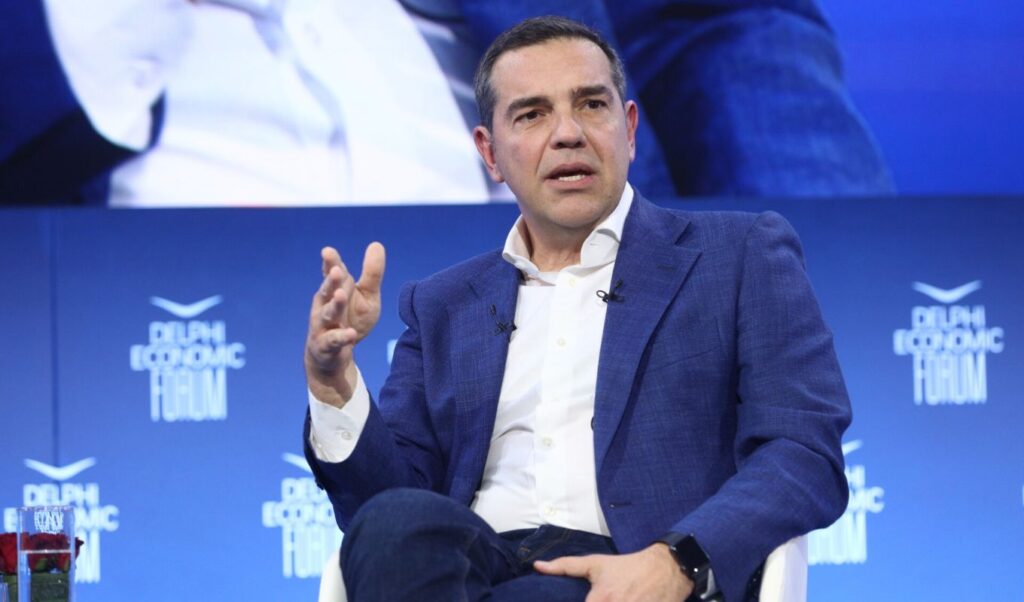Intense reactions and political confrontation were sparked by Alexis Tsipras‘ hints about returning to the active political scene. Most attention was drawn to the sharp statement by the mayor of Kythira, who accused the former prime minister – and current MP – of not even fulfilling his institutional obligations, such as reading the correspondence sent to him.
Read: “Jab” from Kythira mayor against Tsipras: What more active politics than being an MP?
Meanwhile, former Finance Minister Euclid Tsakalotos also intervened with clear barbs, intensifying the already tense climate within the broader center-left.
As scenarios multiply about a possible new political party founded by Alexis Tsipras, his choice to speak to French newspaper Le Monde is particularly interesting, attempting – through a conservative but credible journalistic voice – to restore his image. In his interview, he returned once again to his personal narrative around the events of 2015 and the SYRIZA-ANEL government, trying to redefine his political role in the current situation.
Alexis Tsipras: I miss active politics and contact with voters
“Seven years after the Ithaca of the Greek crisis, the time has come to tell my truth,” the former prime minister told the French newspaper, while also stating that “I miss active politics and contact with voters,” essentially announcing his return. Contact with voters that Mr. Tsipras had essentially lost immediately after signing the third bailout, as he then took about two months to leave Maximos Mansion to meet people. It was then that journalist and one of his closest former associates, Thanasis Karteros, wrote in an article for “Avgi”: “Tsipras remained locked in Maximos”!
Returning to today, it was precisely this phrase that infuriated the mayor of Kythira, Eustratius Charxalakis, who made a sharp statement. In a social media post, he commented caustically: “Until today I knew he was an active MP in our electoral district of Piraeus and Islands A”. “What more active politics than that?” wondered Mr. Charxalakis, adding: “You mean I’ve been sending all the municipality’s requests to his email for nothing all these months?”. And he wasn’t the only one who reacted, as Euclid Tsakalotos took the baton with a Facebook post, while Pavlos Polakis found the opportunity to respond, commenting underneath. Initially, the Finance Minister during the SYRIZA-ANEL government attributed contradictions to the former prime minister regarding economic policy during his tenure and blamed him for allowing, “if not encouraging it,” as he notes, the anti-SYRIZA front to enter SYRIZA, concluding: “Perhaps it would be better to try to approach the truth, however difficult that may be, rather than having parallel truths?”.
Pavlos Polakis didn’t miss the opportunity to respond with a comment on Tsakalotos’ post. “Euclid, you’re being provocative, but I don’t have much appetite today. But I’ll tell you two vowels,” wrote the Chania MP of SYRIZA, who focused mainly on Tsakalotos’ reference to Tsipras encouraging “the anti-SYRIZA front to enter SYRIZA,” made a particular attack on the former Finance Minister’s economic references and emphasized at another point: “Come on, because your leftism on real ISSUES is of the ‘whistle thievishly’ type, while on harmless ‘rights’ issues you act like cicadas in August”! The one who somewhat restrained himself, at least for now, was Nikos Karanikas, once a close friend of Alexis Tsipras. In a repost of the news about the former prime minister’s interview with “Le Monde,” which Vangelis Pilalis, a SYRIZA Central Committee member and one of the few within the party who still belong to Tsipras’ circle, made on his personal Facebook page, Mr. Karanikas commented: “Come on, let me not open my mouth”. Obviously there were also positive reactions. Alexis Tsipras may answer “For now I’m writing my book. I’m not thinking about anything else” when asked if he will return to the political scene with his own new party, but no one expected him to announce through a foreign newspaper what his own friends are eagerly awaiting. Indicative was the “call” from Tsipras’ “right hand,” Giorgos Vassiliadis, who writes in his article “Why we need a new post-transition period.”
Regarding the rest of what Alexis Tsipras mentions in his interview, the former prime minister analyzes the causes of the crisis, his government’s successes, and the country’s current economic situation. According to Alexis Tsipras, Greece was led into economic crisis due to three critical factors: a dysfunctional production model, extensive corruption, and the clientelist state. This crisis constituted a real odyssey for the Greek people, with the exit from international economic programs in 2018 marking the beginning of a new era. However, the former prime minister criticizes the government for not adequately exploiting the opportunities offered by the end of financial support. He argued that his own government chose to burden the wealthier and reduced inequalities, while the current government, according to him, protects the “elites”.




